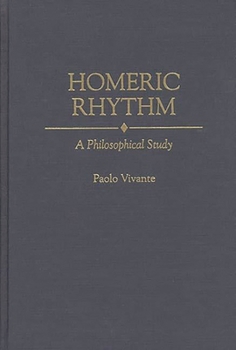Homeric Rhythm: A Philosophical Study
In a follow-up to his previous Homeric studies, noted classicist Paolo Vivante explores Homer's verse, highlighting rhythm rather than metre. Rhythmical qualities, he argues, constitute the force of the verse--for example, in the way the words take position and in the way each pause hints suspense, producing an immediate sense of time. Vivante's main concern is not with the techniques or rules of the verse-composition, but more philosophically with...
Format:Hardcover
Language:English
ISBN:0313303630
ISBN13:9780313303630
Release Date:October 1997
Publisher:Praeger
Length:176 Pages
Weight:0.94 lbs.
Dimensions:0.4" x 6.1" x 9.2"
Customer Reviews
0 rating





